10 Habits that helps to keep your Mental Health Stable
Good mental health is important for overall well-being and quality of life
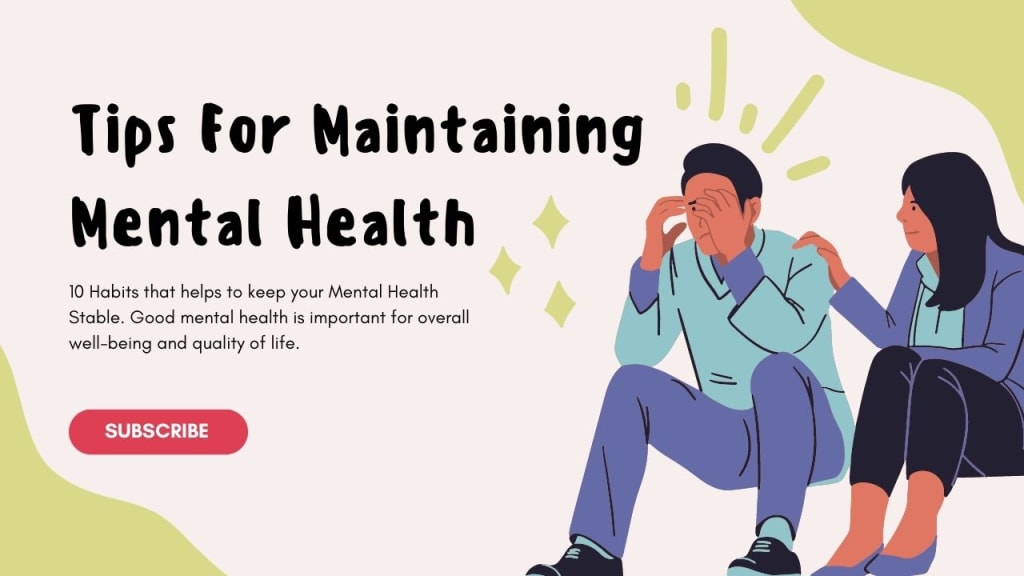
Good mental health is important for overall well-being and quality of life. In this topic, we will discuss the best habits that can help maintain good mental health and stability. These habits include things like regular exercise, healthy eating, getting enough sleep, socializing, practicing mindfulness, seeking support from friends and family, and engaging in meaningful activities. By adopting these habits and making them a regular part of your routine, you can help to promote good mental health and prevent issues such as stress, anxiety, and depression.
There are many habits that can help to maintain good mental health and stability.
Here are some of the most important ones:
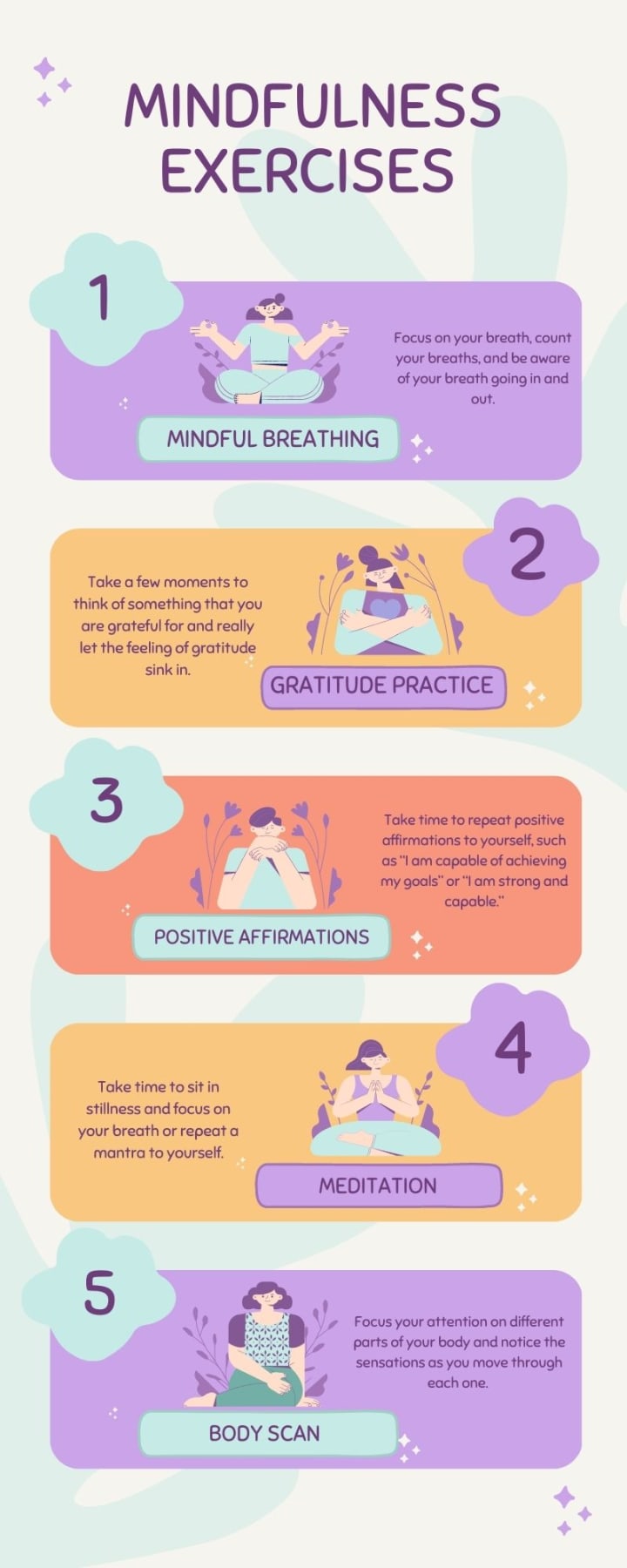
1. Regular exercise:
Exercise can help reduce stress and anxiety, improve mood, and increase overall well-being.
Exercise has numerous mental health benefits, including reducing stress and anxiety, improving mood, and increasing overall well-being. Regular exercise can reduce the production of the stress hormone cortisol, increase the production of mood-boosting neurotransmitters like serotonin, and improve self-esteem and confidence.
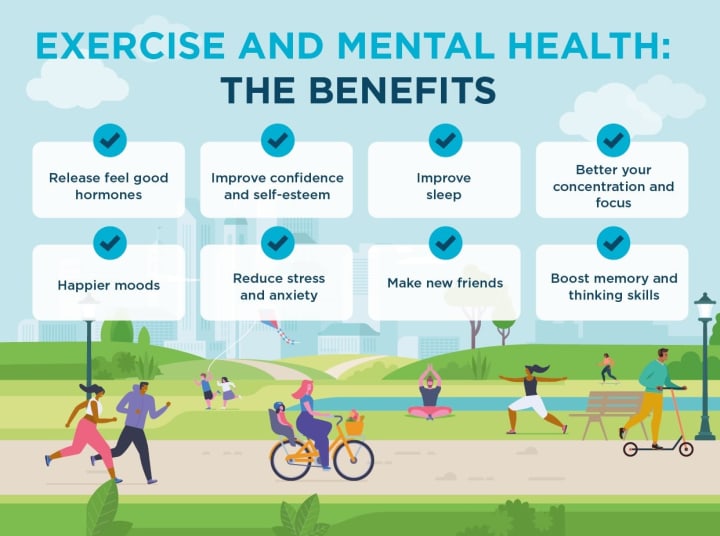
Additionally, exercise can improve physical health, which can contribute to improved mental health outcomes. To reap the benefits of exercise for mental health, it's recommended to aim for at least 30 minutes of moderate exercise most days of the week.
2. Adequate sleep:
Getting enough sleep is crucial for maintaining mental health. Aim for 7-9 hours of sleep per night.
Getting adequate sleep is important for maintaining good mental health. Sleep deprivation can contribute to a number of mental health issues, including anxiety, depression, and mood swings. When we sleep, our brains have a chance to rest and recharge, allowing us to better manage stress and emotions the next day.
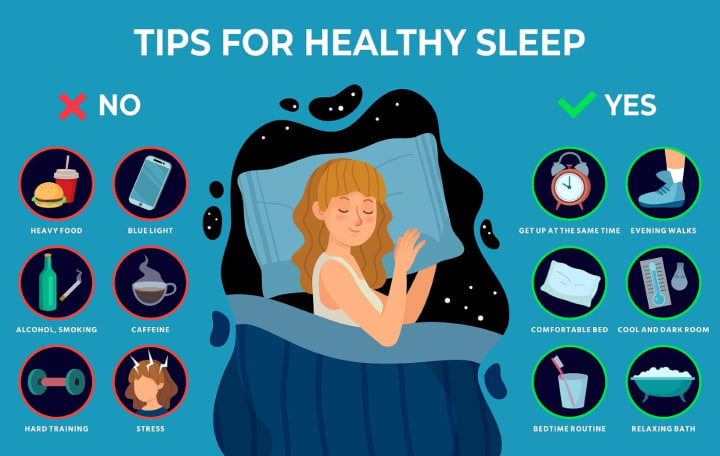
Experts recommend adults aim for 7-9 hours of sleep per night. However, the exact amount of sleep needed may vary depending on factors like age, lifestyle, and health conditions. To improve sleep quality, it's important to establish a consistent sleep routine, avoid caffeine and alcohol before bedtime, and create a sleep-conducive environment.
This may include keeping the bedroom cool and dark, limiting screen time before bed, and investing in a comfortable mattress and pillows. By prioritizing adequate sleep, we can improve our mental health and overall well-being.
3. Healthy eating:
Eating a balanced and nutritious diet can help support mental health. Foods rich in Omega-3 fatty acids, such as fish, nuts, and seeds, can be particularly beneficial.
Eating a balanced and nutritious diet is important for maintaining good physical and mental health. Research suggests that certain foods and nutrients may have specific benefits for mental health, and that a diet high in processed and unhealthy foods may increase the risk of mental health issues like depression and anxiety.
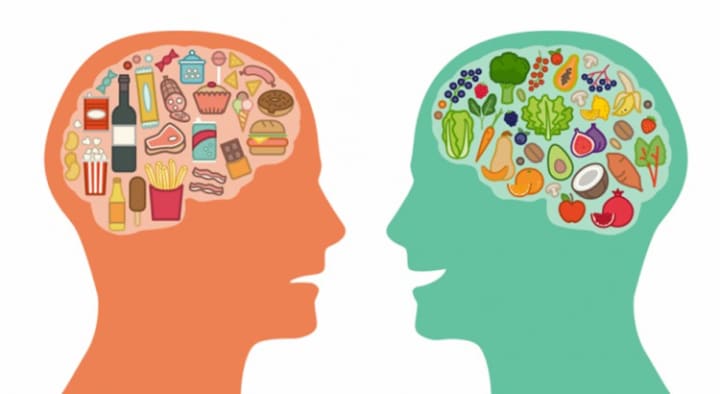
One nutrient that has been shown to be particularly beneficial for mental health is omega-3 fatty acids. Omega-3s are found in fatty fish like salmon and tuna, as well as in nuts and seeds like walnuts and flaxseeds. Studies have found that omega-3s can help reduce symptoms of depression and anxiety, and may even improve brain function.
Other nutrients that may be beneficial for mental health include B vitamins, magnesium, and probiotics. B vitamins are important for brain function and mood regulation, while magnesium has been linked to a lower risk of depression. Probiotics, found in fermented foods like yogurt and kefir, may help improve gut health, which has been linked to improved mental health outcomes.
To support mental health through diet, it's important to focus on whole, nutrient-dense foods like fruits, vegetables, whole grains, lean proteins, and healthy fats. Avoid processed and sugary foods, which can contribute to inflammation and worsen mental health issues. By prioritizing a balanced and nutritious diet, we can support our mental and physical health for long-term well-being.
4. Mindfulness and meditation:
Practicing mindfulness and meditation can help reduce stress and anxiety, improve mood, and increase self-awareness.
Practicing mindfulness and meditation is an effective way to improve mental health and well-being. Mindfulness involves being present and fully engaged in the current moment, without judgment or distraction. Meditation is a technique that involves focusing the mind on a specific object or sensation, such as the breath.
Research suggests that mindfulness and meditation can help reduce stress and anxiety, improve mood, and increase self-awareness. These practices have been shown to reduce activity in the amygdala, the part of the brain that processes fear and anxiety.

They can also increase activity in the prefrontal cortex, which is responsible for executive functions like decision-making and emotional regulation.
By regularly practicing mindfulness and meditation, individuals can develop greater self-awareness and learn to better manage difficult emotions and thoughts. These practices can also improve overall well-being and quality of life.
To get started with mindfulness and meditation, it's helpful to find a quiet and comfortable space to practice. There are a variety of techniques and resources available, from guided meditations to mindfulness apps. Even just a few minutes of daily practice can have significant benefits for mental health and well-being.
5. Social support:
Maintaining strong social connections with friends and family can help provide a sense of belonging and reduce feelings of loneliness.
Maintaining strong social connections with friends and family is an important aspect of mental health and well-being. Humans are social creatures and thrive on social interactions and relationships. Having a sense of belonging and support from others can provide a buffer against stress, reduce feelings of loneliness and isolation, and improve mood.
Research suggests that social support can have a range of mental health benefits, including reducing symptoms of depression and anxiety, improving self-esteem, and increasing overall well-being. Social connections can provide emotional support, practical assistance, and a sense of purpose and belonging.

To maintain strong social connections, it's important to prioritize relationships with friends and family. This may involve regular communication and spending time together, as well as engaging in shared activities and hobbies. It's also important to build new connections and social support networks, which can be done through volunteering, joining clubs or groups, or participating in social events.
By prioritizing social connections and building a strong support network, individuals can improve their mental health and overall well-being.
6. Time management:
Learning to prioritize and manage time effectively can help reduce stress and increase productivity.
Time management is the practice of organizing and prioritizing tasks and activities to make the most efficient use of time. Learning to manage time effectively can have significant benefits for mental health and productivity.
When we feel overwhelmed or disorganized, it can lead to increased stress and anxiety. By taking the time to prioritize tasks and create a plan for managing time, we can reduce these feelings of overwhelm and improve our ability to focus and be productive.

Effective time management can also help us achieve our goals and reduce the likelihood of procrastination. By breaking tasks down into smaller, manageable steps and setting deadlines for completion, we can stay on track and avoid feeling overwhelmed.
To improve time management skills, it's important to identify priorities and create a plan for tackling tasks. This may involve creating a to-do list or using a planner to track deadlines and progress. It's also important to identify potential distractions and set boundaries to avoid getting sidetracked.
By effectively managing time, individuals can reduce stress, improve productivity, and achieve their goals more efficiently. This can have significant benefits for mental health and overall well-being.
7. Hobbies and interests:
Engaging in activities that bring enjoyment and a sense of accomplishment can help improve mood and overall well-being.
Engaging in hobbies and interests is an important aspect of mental health and well-being. Pursuing activities that bring enjoyment and a sense of accomplishment can have a range of benefits for mental health.
Engaging in hobbies and interests can provide a sense of purpose and meaning, reduce stress, and improve mood. Activities like gardening, painting, or playing music can provide a sense of accomplishment and improve self-esteem. Engaging in physical activities like sports or hiking can also provide physical and mental health benefits.

Research has also shown that engaging in creative activities can have therapeutic benefits, such as reducing symptoms of depression and anxiety. These activities can provide an outlet for self-expression and emotional regulation.
To reap the benefits of hobbies and interests, it's important to identify activities that are enjoyable and meaningful. This may involve trying out new hobbies or revisiting past interests. It's also important to make time for these activities and prioritize them as a part of self-care.
By engaging in hobbies and interests, individuals can improve their mood, reduce stress, and increase overall well-being.
8. Seeking help when needed:
If you are experiencing persistent symptoms of mental health issues, seek professional help from a mental health provider. Therapy and medication can be effective in treating mental health conditions.

"Take control of your mental health today! At Arukah Canceling Services. They offer professional and compassionate counseling services to help you overcome life's challenges and achieve your goals. Whether you're dealing with anxiety, depression, relationship issues, or any other mental health concern, the team of psychologists can provide you with the support and guidance you need.
Arukah Couseling services are tailored to your individual needs and are designed to help you achieve your goals in a safe, non-judgmental environment. The services are available in-person or online, making it easy and convenient for you to get the help you need, wherever you are.
Don't wait any longer to take care of your mental health. Contact today to schedule your first appointment and take the first step towards a happier, healthier you."
9. Limiting screen time:
While technology has many benefits, excessive screen time can negatively impact mental health. Set limits on the amount of time spent on electronic devices, especially before bedtime.
10. Gratitude:
Practicing gratitude can help shift focus away from negative thoughts and feelings and improve overall well-being. Try keeping a gratitude journal and regularly writing down things you are thankful for.

Yes, journaling can be an effective tool for maintaining good mental health. Writing down one's thoughts and feelings can help to clarify emotions, gain insight into patterns of behavior, and identify triggers for stress or anxiety. Some of the benefits of journaling for mental health include:
Reducing stress: Writing about one's worries and concerns can help to reduce stress and anxiety. By putting thoughts on paper, individuals may feel a sense of release and be able to approach problems with a clearer mind.
Improving mood: Journaling can help individuals identify positive experiences and accomplishments, leading to improved mood and increased self-esteem.
Increasing self-awareness: Writing about one's thoughts and feelings can help to increase self-awareness and understanding of patterns of behavior, which can be helpful for managing emotions and relationships.
Providing perspective: Journaling can provide a sense of perspective and objectivity, helping individuals see situations from a different angle and approach them with greater clarity.
Improving problem-solving skills: Writing about challenges and obstacles can help individuals approach problems with a problem-solving mindset, leading to improved resilience and coping skills.
Overall, journaling can be a helpful tool for maintaining good mental health. It's important to note that journaling is not a substitute for professional help if you are struggling with mental health issues, but it can be a useful supplement to therapy or medication.
Remember that mental health is a journey, and it's important to be patient and compassionate with yourself as you work on incorporating these habits into your life. If you are struggling with mental health issues, don't hesitate to seek professional help. With the right support and habits, it's possible to maintain good mental health and lead a fulfilling life.






Comments
There are no comments for this story
Be the first to respond and start the conversation.